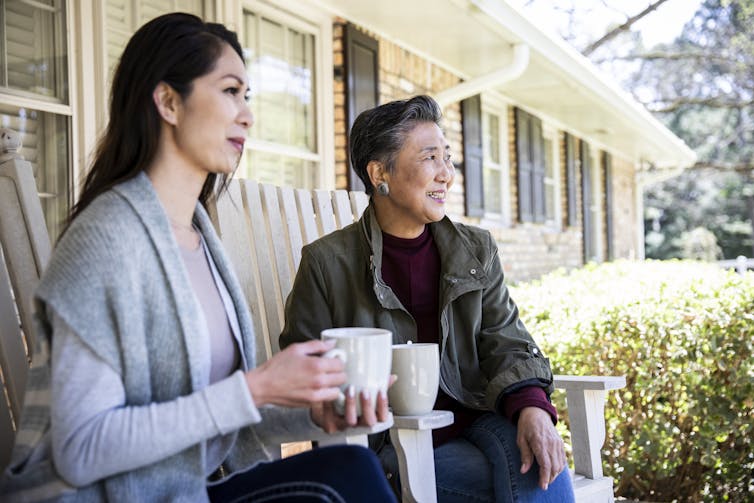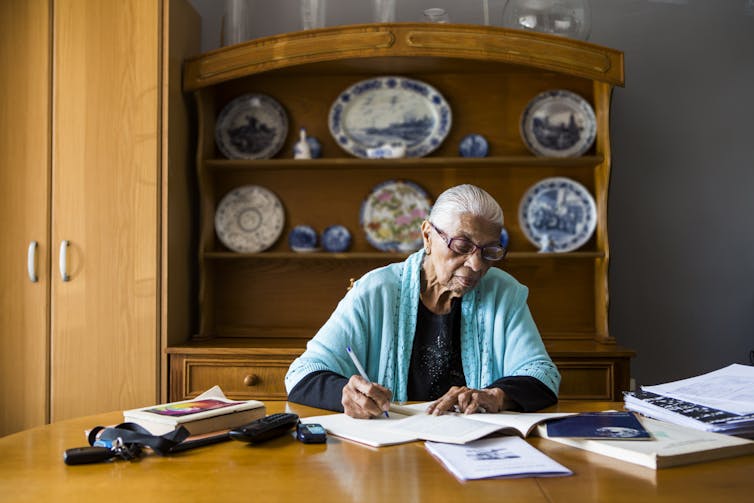End-of-life conversations can be hard, but your loved ones will thank you

Richard Ross/The Image Bank via Getty Images
Deborah Carr, Boston University
Death – along with taxes – is one of life’s few certainties. Despite this inevitability, most people dread thinking and talking about when, how or under what conditions they might die.
They don’t want to broach the topic with family, either, for fear of upsetting them. Ironically, though, talking about death “early and often” can be the greatest gift to bestow on loved ones.
As a sociologist who has studied end-of-life issues for more than two decades, I’ve learned that people know they should talk about death honestly and openly, but surprisingly few do. In fact, one recent study showed that while 90% of adults say that talking to their loved ones about their end-of-life wishes is important, only 27% have actually had these conversations.
It’s frightening to think about our own suffering, or our loved ones’ distress. But everyone should talk about and prepare for death precisely because we want to minimize our own suffering at the end of life, and soften the anguish of loved ones left behind.
No time to plan
These conversations are more urgent now than ever, as the COVID-19 pandemic has changed how Americans die.
For the past several decades, most adults have died from chronic illnesses like heart disease, cancer and lung disease. The time between diagnosis and death for people with these conditions can be months or even years. That gives patients and their families ample time to share their feelings, resolve unfinished business, and make practical preparations for death – including estate planning, advance care planning and even planning a celebration of life that bears the dying patient’s creative imprint.
But when the pandemic struck in 2020, COVD deaths began to occur quickly and unexpectedly, with many patients dying just days after they felt their first symptoms. Their families were robbed of final moments together and often had no documents in place to guide the patient’s health care or the distribution of their possessions. This suddenness, isolation and lack of preparedness all are hallmarks of a “bad death” for both the patient and their family.
What to cover
Advance care planning, which typically involves a living will and a health care proxy, allows people to articulate which medical treatments they want or don’t want at the end of life.
A living will formally articulates preferences for care, such as whether to use comfort measures like hospice and palliative care, or more invasive measures like feeding tubes and ventilators. Documenting these preferences when the patient is still able to make those decisions helps to ensure they die on their own terms – a cornerstone of the “good death.”
Appointing a health care proxy when still relatively young and healthy gives people an opportunity to decide who will be tasked with their end-of-life decision-making. It also clarifies loved ones’ responsibilities and can fend off arguments that could arise around the deathbed. Having these discussions early also prevents panicked choices when someone’s health takes a dramatic turn for the worse.

MoMo Productions/DigitalVision via Getty Images
End-of-life discussions also help you to construct your own legacy. In “Death and Identity,” a classic book in death studies, sociologist Robert Fulton observed that “preserving rather than losing … personal identity” is a critical aspect of the dying process. Being treated like a “whole person” is a core component of a good death, and honest discussions are a key to maintaining your unique identity, even at the end of life.
Conversations also help us share how we’d like to be celebrated after we’re gone. This might be as simple as dictating the music, food, and photo or video displays for a memorial service; where to spread ashes; or charities for mourners to support. Some people take more ambitious steps at leaving behind a legacy, such as penning an autobiography or leaving behind videos for relatives. Creating a “post-self” that lingers years after the body has died can be a cherished gift to families.
Getting started
Broaching these conversations can be awkward or unnerving, but it doesn’t have to be. Death is a natural and inevitable part of life and should be approached as such. I have argued that the end of life is a stage, just as childhood, adolescence and old age are.
Each stage teaches lessons for the others that lie ahead.
Children learn skills in school that they’ll need to enter the workforce. Teens learn how to navigate romantic relationships as preparation for the future. Adults of all ages can learn about hospice and end-of-life medical care, make preparations for passing on their inheritance and discuss how they’d like to be honored in death. These steps can help attain an end of life marked by peace and self-directedness, rather than strife and the loss of autonomy.

Lauren Mulligan/Moment via Getty Images
Ample resources are available to guide these conversations. Organizations like The Conversation Project – not related to The Conversation – have created guides for productive end-of-life discussions. Advance care planning documents ranging from living wills to the “Five Wishes” program, which helps clarify people’s values about how they’d like to spend their final days, can be a good starting point.
[Over 140,000 readers rely on The Conversation’s newsletters to understand the world. Sign up today.]
A simple introduction like “I need to think about the future. Will you help me?” is a good icebreaker. And the first conversation eases the path to future chats, because changes in physical health, family relations and mental sharpness may necessitate revisions in end-of-life plans.
By discussing these issues during calm times, such as after a holiday get-together or birthday dinner, we can feel prepared and empowered as we and our families approach the inevitable.![]()
Deborah Carr, Professor of Sociology and Director of Center for Innovation in Social Science, Boston University
This article is republished from The Conversation under a Creative Commons license. Read the original article.

